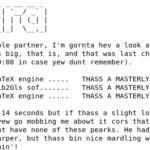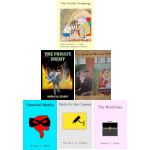Dickimaw Books Blog 
Turbot the Witch 🔗

[Previously posted on Goodreads 2018-04-29.] I had an interesting encounter with a couple of children as I was heading back into the village after walking around the muddy footpaths and byways around the area. (This is not only setting the scenic background detail, but also noting that I might’ve had a slightly dishevelled and windswept appearance as a result.) In general, I find it a bit awkward when unknown children want to strike up a conversation as on the one hand I don’t want to encourage them to talk to strangers, but on the other hand I don’t want to appear rude, so when they called out a friendly greeting, I gave a friendly acknowledgement without breaking my stride, but the girl called me back.
‘Hello, whoever you are. Who are you?’ she asked.
‘I live in the village,’ I replied, non-committally. Since she seemed to require more detail, I added: ‘My son used to go to the village school.’
‘Is he So-and-so?’ she asked.
(I don’t think I ought to disclose names in a public post, so let’s just stick with So-and-so.)
‘No,’ I said. ‘My son’s grown up and has left school now.’
‘Are you So-and-so’s granny?’
‘No.’
‘So-and-so’s granny is 68.’
‘I’m not that old,’ I said. ‘I’m not even 50.’
‘Are you 49?’ the boy asked.
I could see that this was going to lead to a guessing game, and he was only two off, so I decided to just cut straight in there with the answer.
‘No, I’m 47.’
‘I hope you don’t mind me saying this,’ the boy said, in a very polite tone of voice, ‘but you look much older.’
‘Are you a witch?’ the girl asked.
‘No,’ I said, ‘but if I was a witch, I might not admit it.’
I’m not sure if they grasped the sub-text there: people aren’t always what they claim to be (or not be).
‘Do you know So-and-so?’ the girl asked, reverting the subject back to whoever he is, but apparently he’s a boy in their school.
‘No, I don’t know So-and-so, and I think you should be careful about talking to strangers.’
‘Are you a stranger? What’s your name?’
‘I have two names,’ I replied. ‘My real name is Nicola Cawley, but my writing name is Talbot.’
‘Turbot?’
‘No, Talbot.’
Clearly, they haven’t yet heard of a local village author of children’s stories that are charmingly illustrated by a talented artist from nearby Poringland.
‘If you’re a witch,’ the girl said, ‘you could turn me into a dog.’
‘Witches don’t exist,’ the boy said.
‘Well, either I’m not a witch or I don’t exist,’ I replied.
All those years studying mathematics haven’t been wasted. I can still apply logical reasoning in a conversation with kids. As I finally walked away, a voice called after me:
‘Goodbye, Whatever-your-name-is Turbot.’

So now I feel that Turbot the Witch has to appear in a story. Perhaps she should join Sir Quackalot, Dickie Duck, José Arara and friends. Sir Quackalot, for those of you who don’t know, started life in the TeX.SE chatroom in a little story containing TeX-related jokes to amuse my friend Paulo who likes ducks and is the creator of an application called arara, which means macaw in Portuguese. The story was called ‘Sir Quackalot and the Golden Arara.’ The image of Sir Quackalot on the right is created using the tikzducks package. The code is:
\documentclass{article}
\usepackage[T1]{fontenc}
\usepackage{tikzducks}
\begin{document}
\begin{tikzpicture}
\begin{scope}[rotate=-15,shift={(-0.5,0.2)}]
\draw[fill=black!40]
(1,0.5) -- (0.2,0.5) -- (0, 0.55) -- (0.2,0.6) -- (1, 0.6) -- cycle;
\end{scope}
\duck[cape=darkgray,shorthair=darkgray]
\begin{scope}[rotate=-20,shift={(.25,0.25)}]
\draw[fill=black!50]
(0,1) .. controls (0.05, 0.57) and (0.23, 0.23) .. (0.5, 0)
.. controls (0.77, 0.23) and (0.95, 0.57) .. (1, 1)
.. controls (0.83, 0.9) and (0.67, 0.9) .. (0.5, 1)
.. controls (0.33, 0.9) and (0.07, 0.9) .. cycle;
\node[orange,at={(0.5,0.5)}] {\bfseries\large Q};
\end{scope}
\end{tikzpicture}
\end{document}
Sir Quackalot next made an appearance in LaTeX for Administrative Work as the author of titles such as ‘The Adventures of Duck and Goose’, ‘The Return of Duck and Goose’ and ‘More Fun with Duck and Goose’ in one of the sample datasets that accompanies the textbook. The more adventurous reader can, in Exercise 12 (Chapter 4), try to programmatically fetch the titles from the database to typeset an invoice for José Arara’s book order.
The sample data also includes a list of people, such as Dickie Duck, Polly Parrot, Mabel Canary and (to test UTF-8 support) José Arara of São Paulo. At various times in the textbook, they are customers (as in the above invoice exercise), letter recipients (Chapter 3, typesetting correspondence), job applicants (Chapter 5, typesetting a CV), and members of the Secret Lab of Experimental Stuff (and their co-researchers in the Department of Stripy Confectioners) who have to write memos, press releases, and minutes. They also have to redact classified information, use hierarchical numbering in their terms and conditions, prepare presentations, a z-fold leaflet advertising their highly classified projects, and collaborate on documents.
Dickie Duck also moonlights as the author of ‘Oh No! The Chickens have Escaped!’ illustrated by José Arara, whose paintings bear an uncanny resemblance to digitally manipulated photos of my mum’s chickens. In Chapter 10, they have to create a postcard and design an advance information sheet to advertise the book.
Sir Quackalot reappears in my testidx package, which is designed for testing indexing applications with LaTeX. My original plan was to use dummy text, but I’ve grown bored of lorem ipsum and I wanted the first few paragraphs to be informative. I also needed the index to cover the full Basic Latin letter groups A, …, Z as well as some extended Latin characters commonly used in European languages, such as Ð (eth), Þ (thorn) and Ø. After five pages of filler text, I discovered that some of the letter groups were still missing, so I added the story of ‘Sir Quackalot and the Golden Arara’, which provided an extra page of text and conveniently helped with the rather sparse Q letter group. The code to produce the document is quite simple:
\documentclass{article}
\usepackage{imakeidx}
\usepackage{testidx}
\makeindex
\begin{document}
\testidx
\printindex
\end{document}
For those who don’t have a TeX distribution, here’s a PDF I made earlier. That example only has the Basic Latin groups. There’s a fancier example with hyperlinks, extended letter groups, digraphs (IJ, Ll, etc) and a trigraph (Dzs): source code and the final PDF created from it (using XeLaTeX and bib2gls).

So if you read my textbooks or manuals, watch out for a cameo from Turbot the Witch. What does she look like? I think tikzducks can supply the answer again:
\documentclass{article}
\usepackage{tikzducks}
\begin{document}
\begin{tikzpicture}
\duck[witch=black!70,longhair=brown!60!gray,jacket=black!70,magicwand]
\end{tikzpicture}
Next Post
 An application that supports localisation is one that is designed to allow textual information to be displayed in different languages, and (where necessary) to format certain elements, such as dates or currency, according to a particular region.
An application that supports localisation is one that is designed to allow textual information to be displayed in different languages, and (where necessary) to format certain elements, such as dates or currency, according to a particular region.Previous Post
Recent Posts
 There are a growing number of digital historians who are interested in documenting old computing systems from the twentieth century, but much of the information has been lost and coincident names can make it hard to search. This article is about the RISC OS ARMTeX distribution, which provided TeX and LaTeX for the ARM-powered Acorn computers in the 1990s.
There are a growing number of digital historians who are interested in documenting old computing systems from the twentieth century, but much of the information has been lost and coincident names can make it hard to search. This article is about the RISC OS ARMTeX distribution, which provided TeX and LaTeX for the ARM-powered Acorn computers in the 1990s. The DRM-free ebook retailer SmashWords has its annual Summer/Winter sale from 1st – 31st July 2025. My crime novel “The Private Enemy” and children’s illustrated story “The Foolish Hedgehog” both have a 50% discount, and my crime fiction short stories “I’ve Heard the Mermaid Sing”, “Unsocial Media”, “Smile for the Camera”, and “The Briefcase” have a 100% discount (i.e. free!) for the duration of the sale. Did you know that you can gift ebooks on SmashWords?
The DRM-free ebook retailer SmashWords has its annual Summer/Winter sale from 1st – 31st July 2025. My crime novel “The Private Enemy” and children’s illustrated story “The Foolish Hedgehog” both have a 50% discount, and my crime fiction short stories “I’ve Heard the Mermaid Sing”, “Unsocial Media”, “Smile for the Camera”, and “The Briefcase” have a 100% discount (i.e. free!) for the duration of the sale. Did you know that you can gift ebooks on SmashWords? If you have read my short story Smile for the Camera, did you notice that the ending could have two possible interpretations? (No spoilers please!) As a writer, it’s always difficult to tell if something is too obvious or too obscure. If you need a hint, consider the naming scheme and remember that not everyone is what they say or imply that they are.
If you have read my short story Smile for the Camera, did you notice that the ending could have two possible interpretations? (No spoilers please!) As a writer, it’s always difficult to tell if something is too obvious or too obscure. If you need a hint, consider the naming scheme and remember that not everyone is what they say or imply that they are. The Ex-Cathedra writing group were delighted to present a cheque for £1,400 to St Martins Housing Trust during their collection at Tesco Harford Bridge on 6th December 2024. The money was raised from sales of the book Tales for Our Times, an anthology of short stories written by the group. The cheque was received by Ian Hanwell on behalf of St Martins. Many thanks to the support of everyone who purchased a copy and to the staff at Tesco Harford Bridge for allowing us to make the presentation there.
The Ex-Cathedra writing group were delighted to present a cheque for £1,400 to St Martins Housing Trust during their collection at Tesco Harford Bridge on 6th December 2024. The money was raised from sales of the book Tales for Our Times, an anthology of short stories written by the group. The cheque was received by Ian Hanwell on behalf of St Martins. Many thanks to the support of everyone who purchased a copy and to the staff at Tesco Harford Bridge for allowing us to make the presentation there. Search Blog
📂 Categories
- Autism
- Books
- Children’s Illustrated Fiction
- Illustrated fiction for young children: The Foolish Hedgehog and Quack, Quack, Quack. Give My Hat Back!
- Creative Writing
- The art of writing fiction, inspiration and themes.
- Crime Fiction
- The crime fiction category covers the crime novels The Private Enemy and The Fourth Protectorate and also the crime short stories I’ve Heard the Mermaid Sing and I’ve Heard the Mermaid Sing.
- Fiction
- Fiction books and other stories.
- Language
- Natural languages including regional dialects.
- (La)TeX
- The TeX typesetting system in general or the LaTeX format in particular.
- Music
- Norfolk
- This category is about the county of Norfolk in East Anglia (the eastern bulgy bit of England). It’s where The Private Enemy is set and is also where the author lives.
- RISC OS
- An operating system created by Acorn Computers in the late 1980s and 1990s.
- Security
- Site
- Information about the Dickimaw Books site.
- Software
- Open source software written by Nicola Talbot, which usually has some connection to (La)TeX.
- Speculative Fiction
- The speculative fiction category includes the novel The Private Enemy (set in the future), the alternative history novel The Fourth Protectorate, and the fantasy novel Muirgealia.
🔖 Tags
- Account
- Alternative History
- Sub-genre of speculative fiction, alternative history is “what if?” fiction.
- book samples
- Bots
- Conservation of Detail
- A part of the creative writing process, conservation of detail essentially means that only significant information should be added to a work of fiction.
- Cookies
- Information about the site cookies.
- Dialect
- Regional dialects, in particular the Norfolk dialect.
- Docker
- Education
- The education system.
- Ex-Cathedra
- A Norfolk-based writing group.
- Fantasy
- Sub-genre of speculative fiction involving magical elements.
- File formats
- FlowframTk
- A vector graphics application written in Java that can export to pgf picture drawing code but can also be used to construct frames for use with the flowfram package. Home page: dickimaw-books.com/software/flowframtk. (FlowframTk was originally called JpgfDraw.)
- Hippochette
- A pochette (pocket violin) with a hippo headpiece.
- History
- I’ve Heard the Mermaid Sing
- A crime fiction short story (available as an ebook) set in the late 1920s on the RMS Aquitania. See the story’s main page for further details.
- Inspirations
- The little things that inspired the author’s stories.
- Linux
- Migration
- Posts about the website migration.
- Muirgealia
- A fantasy novel. See the book’s main page for further details.
- News
- Notifications
- Online Store
- Posts about the Dickimaw Books store.
- Quack, Quack, Quack. Give My Hat Back!
- Information about the illustrated children’s book. See the book’s main page for further details.
- Re-published
- Articles that were previously published elsewhere and reproduced on this blog in order to collect them all together in one place.
- Sale
- Posts about sales that are running or are pending at the time of the post.
- Site settings
- Information about the site settings.
- Smile for the Camera
- A cybercrime short story about CCTV operator monitoring a store’s self-service tills who sees too much information.
- Story creation
- The process of creating stories.
- TeX Live
- The Briefcase
- A crime fiction short story (available as an ebook). See the story’s main page for further details.
- The Foolish Hedgehog
- Information about the illustrated children’s book. See the book’s main page for further details.
- The Fourth Protectorate
- Alternative history novel set in 1980s/90s London. See the book’s main page for further details.
- The Private Enemy
- A crime/speculative fiction novel set in a future Norfolk run by gangsters. See the book’s main page for further details.
- Unsocial Media
- A cybercrime fiction short story (available as an ebook). See the story’s main page for further details.
- World Book Day
- World Book Day (UK and Ireland) is an annual charity event held in the United Kingdom and the Republic of Ireland on the first Thursday in March. It’s a local version of the global UNESCO World Book Day.
- World Homeless Day
- World Homeless Day is marked every year on 10 October to draw attention to the needs of people experiencing homelessness.

